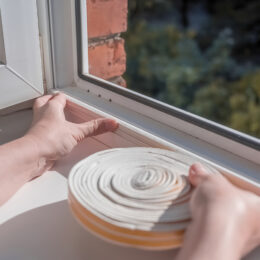For many of us, the best holidays involve home-cooked meals and wonderful aromas of turkey, stuffing and baked goods wafting throughout the house. It means a busy kitchen and a bustling house full of family and friends. It’s that Norman Rockwell image of “Freedom from Want” — a bountifully-set table surrounded by loved ones.
With that old grandmotherly admonition — “waste not, want not” — brought to mind, we’ve added a supplemental freedom — “Freedom from Waste.”

Joining Willie and Wilma Wiredhand around their table in this sendup of Norman Rockwell’s famed “Freedom from Want” are Electric Consumer and Indiana Electric Cooperatives staff members (from right): Richard G. Biever, Ellie Price, Holly Huffman, Andrea Carr and Emily Schilling. At far left is the likeness of Andrew McLay, the free-lance artist who created Willie Wiredhand as the friendly symbol and mascot of the nation’s electric cooperatives in 1950. Photo illustration by Richard G. Biever/apologies to Norman Rockwell
Being frugally-minded means there will be more to go around for all. And saving energy this holiday season will also be rewarded on your January electric bill! So, despite the increased kitchen activity, let’s look at some ways to save this holiday season.
Cut carbs (carbon) painlessly
In addition to being the “heart of your home,” your kitchen could pump savings back into your wallet. According to the Department of Energy, cooking accounts for 4.5 percent of total energy use in U.S. homes. This number, combined with the energy use associated with refrigeration, dishwashing and water heating means that as much as 15 percent of the energy in the average American home is used in the kitchen. So, saving energy here can have a significant impact on your household budget.
For example, when preparing side dishes, baked goods, soups and such, consider using small appliances like a crock pot, toaster oven, microwave or warming plate instead of your conventional oven or stovetop. These small appliances are a smart, energy-saving alternative, typically using about half the energy of a stove.
Seal in efficiency
When using your oven, don’t peek! Opening the oven door can lower the temperature by as much as 25 degrees and causes your stove to work harder (consuming more energy) to return to the desired cooking temperature.
If your recipe calls for baking the dish more than an hour, it is not necessary to preheat the oven. If your oven is electric, you can likely turn the oven off for the last five to ten minutes of cooking and allow the residual heat to complete the job. Clean burners and reflectors increase efficiency and offer better heating, so don’t neglect this small but important task.
Placing the lid on a pot of boiling water or other liquid will trap heat and cause the liquid to come to a boil faster.
Just as keeping the oven door closed seals in efficiency and enables the stove to operate more economically, the same rules apply to the refrigerator and freezer. Keep the doors closed as much as possible so cold air doesn’t escape. However, leaving the door open for a longer period of time while you load groceries or remove items you need is more efficient than opening and closing it several times.
If your refrigerator is an older model, it may not matter how efficient you are when it comes to keeping the door closed and such; your refrigerator just uses more energy than today’s higher efficiency ones. Upgrading this appliance can bring a major return on your investment.
According to Energy Star®, if your refrigerator is from the 1980s, replacing it with a new model could cut your electric bill by $100 a year.
If you are entertaining a large group, you may be able to give your furnace a brief holiday. When your oven is working hard and you have a house full of guests, the heat from the stove and the guests will keep your house comfortable, enabling you to turn down the thermostat.
Clean up with energy savings
When it’s time to clean up, extend fellowship to the kitchen, and wash and dry dirty dishes by hand. This uses less energy than a dishwasher. However, don’t leave the water running continuously, or you will waste energy.
If you do use the dishwasher and rinse dishes before loading them, use cold water. Run the dishwasher with full loads only, and make sure you are using the right setting on your dishwasher. Many newer dishwashers have sensors that detect how clean your dishes are. When these auto cycles are used, they will get dishes clean without wasting energy or water.
The sanitize setting should rarely be used since it is energy intensive. It is also a good idea to make sure the filter at the bottom of the washtub is cleaned. This will help the washer work at its optimal level.
Dishwashers that have overnight or air power dry settings can save up to 10 percent of your dishwashing energy costs.
By adapting these efficient practices in your kitchen, energy savings will be one more thing to be thankful for this holiday season.
Sources: The National Rural Electric Cooperative Association, the Arlington, Virginia-based association serving the nation’s electric cooperatives; the Cooperative Research Network, a service of NRECA; and the U.S. Department of Energy.



